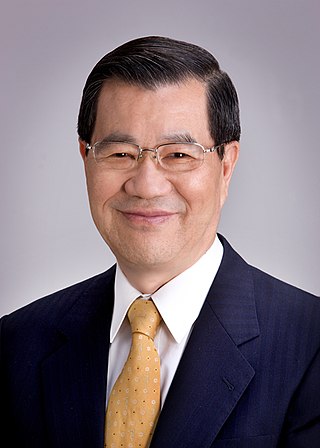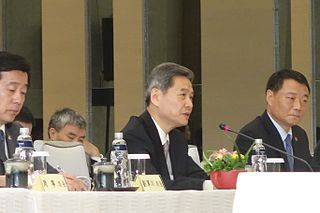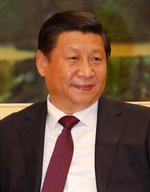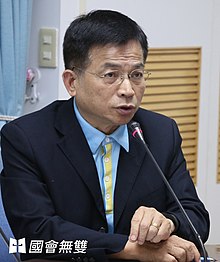
Ma Ying-jeou is a Taiwanese politician who served as the 6th president of the Republic of China from 2008 to 2016. Previously, he served as the 14th justice minister from 1993 to 1996 and mayor of Taipei from 1998 to 2006. He served as chairman of the Kuomintang (KMT) from 2005 to 2007 and from 2009 to 2014.

Vincent C. Siew or Siew Wan-chang is a Taiwanese politician who served as the Vice President of the Republic of China (Taiwan) from 2008 to 2012. He was the first Taiwanese-born Premier of the Republic of China and former vice-chairman of the Kuomintang (KMT).
The National Unification Council was a nonstatutory governmental agency of the Republic of China on Taiwan established on 7 October 1990. Now defunct, its formal aim was to promote the reintegration of mainland China into the Republic of China.
The 1992 Consensus is a political term referring to the alleged outcome of a meeting in 1992 between the semiofficial representatives of the Chinese Communist Party (CCP)-led People's Republic of China (PRC) in mainland China and the Kuomintang (KMT)-led Republic of China (ROC) on Taiwan. They are often credited as creating a diplomatic basis for semi-official cross-strait exchanges which began in the early 1990s and is a precondition set by the PRC for engaging in cross-strait dialogue.

Cross-strait relations are the political and economic relations between mainland China and Taiwan across the Taiwan Strait.

Wu Po-hsiung is a Taiwanese politician who was the chairman of the Kuomintang (KMT). He has been the Interior Minister (1984–1988), Mayor of Taipei (1988–1990), Secretary-General to the President (1991–1996), and Chairman of the KMT (2007–2009). Wu was nominated as Honorary Chairman of the Kuomintang when he was succeeded by Ma Ying-jeou as the Chairman of the Kuomintang.

Presidential elections were held in Taiwan on 14 January 2012. The election was held concurrently with legislative elections. It was the fifth direct election for the President of the Republic of China. Prior to 1996, the President was elected by the ROC's National Assembly and not directly by the people.

Wu Den-yih is a Taiwanese politician. He graduated from National Taiwan University and worked as a journalist before beginning a career in politics with a 1973 appointment to the Taipei City Council. Wu was then elected Magistrate of Nantou County, serving from 1981 to 1989. Following two terms as magistrate, he was named Mayor of Kaohsiung in 1990. Wu remained mayor until 1998, having won the office in a 1994 direct election. He then served two full terms in the Legislative Yuan from 2002 to 2008. Shortly after winning a third term in the legislature, Wu was named Premier of the Republic of China in 2009. He served until 2012, when he and Ma Ying-jeou formed the Kuomintang (KMT) presidential ticket. Wu served one four-year term as Vice President of the Republic of China, stepping down in 2016. In May 2017, he was elected party chairman. Wu stepped down from the position in January 2020. Previously, Wu had served the KMT as secretary-general from 2007 to 2009, first vice chairman in 2014, and as acting chairman in 2014 and 2015.
"Mutual non-recognition of sovereignty and mutual non-denial of authority to govern" is former President of the Republic of China Ma Ying-jeou's description of the relations between the Taiwan Area and Mainland China, as presented in his second inauguration speech after being re-elected in 2012. Sometimes the term special non-state-to-state relations is used in the press for this concept, following his own statements. Ma defines the relations as a "special relationship for which the model of [state] recognition under conventional international law is not applicable". This marks a departure from the views of his predecessors, former presidents Lee Teng-hui's special state-to-state relations and Chen Shui-bian's One Country on Each Side: Both defined the Republic of China (ROC) and the People's Republic of China (PRC) as states and the relationship between the two as one between two states. In Ma's view, the ROC government considers the one China as the ROC, regardless of the view of the PRC government. While neither governing authority can recognize that in the other area as a legitimate state, neither would deny the other side being the de facto governing authority of its area.

Vanessa Shih is a Taiwanese diplomat who began serving as the representative of the Republic of China to Brunei in 2022. She served as representative to Austria between 2016 and 2020. She previously led the Taipei Representative Office in Singapore from 2009 to 2012, when she was named vice minister of foreign affairs. As vice minister Shih advocated for the United Nations to allow the Republic of China to have participation of some forms within the UN.
The Second Chen–Chiang summit was part of a series of the Chen-Chiang summit of cross-strait meetings. It was the first major meeting between the Association for Relations Across the Taiwan Straits (ARATS) and Straits Exchange Foundation (SEF) leaders in Taiwan. The meeting lasted from November 3 to 7, 2008 in Taipei, Taiwan.

Zhang Zhijun is a Chinese diplomat and politician. From 17 March 2013 to 21 March 2018, he has served as the Minister of the Taiwan Affairs Office of the State Council. He is currently the president of the Association for Relations Across the Taiwan Straits since April 2018.

Singapore–Taiwan relations are the international relations between Singapore and Taiwan. Taiwan has a representative office in Singapore. Singapore operates the Singapore Trade Office in Taipei in Taiwan, both of whom are members of the World Trade Organization (WTO). The Presidential Envoy of ROC and Prime Minister of Singapore regularly meet, in the form similar to private state-to-state gesture diplomacy at APEC.

Lin Chu-chia or Steve Lin is a Taiwanese politician. He took junior positions at the Mainland Affairs Council before his 2016 promotion to concurrent posts as National Development Council head and Governor of Fujian Province.

Wu Mei-hung is a Taiwanese politician. She was the Political Deputy Minister and Spokesperson of the Mainland Affairs Council (MAC) of the Executive Yuan from 2013 to 2015.

The Sunflower Student Movement is associated with a protest movement driven by a coalition of students and civic groups that came to a head between March 18 and April 10, 2014, in the Legislative Yuan and later, the Executive Yuan of Taiwan. The activists protested the passage of the Cross-Strait Service Trade Agreement (CSSTA) by the then-ruling Kuomintang (KMT) at the legislature without a clause-by-clause review.
The 2015 Kuomintang chairmanship by-election was held on 17 January 2015 in Taiwan. This was the sixth direct election of the chairman in the Kuomintang history. All registered, due-paying KMT party members were eligible to vote.

On May 4, 2015, General Secretary of the Chinese Communist Party Xi Jinping and Kuomintang (KMT) Chairman Eric Chu met in Beijing.

The presidency of Ma Ying-jeou began on 20 May 2008, when Ma Ying-jeou was sworn in as 11th president of the Republic of China and the sixth president of the republic since it became established on the island of Taiwan, succeeding Chen Shui-bian. Ma won the 2008 Taiwanese presidential election on 22 March 2008 with 58% of the vote, ending eight years of DPP rule and becoming officially recognized as the sixth president of the Republic of China. Ma won with 7,659,014 votes against DPP nominee Frank Hsieh's 5,444,949 votes. Ma's overwhelming victory in the presidential election gave him political mandate to make changes in Taiwan.

On 10 April 2024, Ma Ying-jeou, the former president of the Republic of China, and Xi Jinping, the general secretary of the Chinese Communist Party (CCP) and president of the People's Republic of China, met in Beijing. The meeting was the second meeting between Xi and Ma; the pair previously met in Singapore in 2015, when Ma was still the incumbent president. The meeting was part of Ma's 2024 visit to mainland China, his second visit during his post-presidency.























